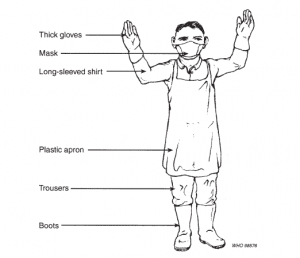Waste Workers Health and Safety: How Protected Are Our Waste Management Workers?
According to the ILO Green Jobs Report in 2013, an estimated 20 million people world-wide earned their living from recycling waste. Waste pickers may work in the streets, open dumps, or landfills where each of them presents different kinds of risks for them.
ILO by the worldbank.org also estimated that 4 million of the 19 – 24 million people in the waste management and recycling sector are formally employed. The waste workers are also exposed to infectious diseases from medical waste, heavy metals, chemical vapors, heat and cold, falls and other injuries.
The Workplace Health Without Borders organization said that most of these workers are under informal employment without access to social protection where earnings are low and risks are high.
The Risks Waste Workers Should Face
According to the International Journal of Occupational Safety and Health, Waste workers working in the municipality dump sites are likely to be exposed to various health risks as they are working in an unhygienic environment. They may suffer many health diseases such as:
- Respiratory symptoms: runny nose, sneezing, frequent headache.
- Musculoskeletal or Neuro symptoms: tiredness, backache, body pain.
- Other symptoms: skin rashes, vomiting and diarrhea
We are not stopping there, waste pickers working in landfill sites face different conditions, namely, vibration from machines, poor ventilation, excessive noise, odour and high temperature that also have negative impact on their health. Especially during the current coronavirus pandemic (COVID-19) the risks and vulnerability of the waste workers are higher than before.

The International Journal of Occupational Safety and Health about Waste Workers and Occupational Health Risks also said that most waste workers have poor living standards as they have inadequate income. It is known that most of the waste workers have poor socio-economic status means they live, cook, eat and drink in the landfill sites, compromising their personal health.
The Standards of Waste Workers’s Protection
Reacting to this condition, WHO released the The Health and Safety Practices for Health-care Personnel and Waste Workers, containing the standards of waste worker’s protection, as follows:
- Proper training of workers:
The training in health and safety should ensure that workers know and understand the potential risks they will face from the direct contact with waste and the importance of consistent use of personal protection equipment as well. - Provision of equipment and clothing for personal protection:
The type of protective clothing will depend to the risk associated with the waste, but the following equipment should be made available to all waste workers: a. Helmets, with or without visors
b. Face masks
c. Eye protectors or safety goggles
d. Overalls (coveralls)
e. Industrial aprons
f. Leg protectors or industrial boots
g. Disposable gloves or heavy-duty gloves



3. Establishment of an effective occupational health programme:
a. Basic personal hygiene: This is important to reduce the risks from handling waste. Ideally there should be provided convenient washing facilities available for all waste personnel.
b. Immunization: Tetanus and Hepatitis B immunizations are also recommended to be given to all handling waste personnel, since the Hepatitis B infections have been reported among the waste handlers and health-care personnel.
c. Post-exposure prophylactic treatment: There should be a program to ensure and train all the waste workers to deal with injuries and exposures. This program may include an immediate report of the incident to additional medical attention if needed.
You can also help protect waste workers by starting to sort your waste at least into organic and inorganic categories and dispose of your medical waste properly as well.
Not only ensuring the waste operator’s welfare, Waste4Change also enforces work standards for waste operators to ensure their health and safety. Every waste sorting operator at Waste4Change must use: 1). Safety gloves, 2). Safety shoes, 3). Safety mask, 4). Safety apron. Waste4Change workers also get routine health checks and practice health protocols: cleaning themselves before and after work, cleaning their work equipment and drying them before use.



Manage your company and business waste wisely with Waste4Change through Reduce Waste to Landfill service.
Read the article in Indonesian version in here
References:
https://www.who.int/water_sanitation_health/medicalwaste/140to144.pdf?ua=1
https://blogs.worldbank.org/sustainablecities/waste-workers-are-protecting-our-communities-during-covid-19
https://www.whwb.org/wwosh/current-projects/waste-workers-occupational-safety-health/
https://www.researchgate.net/publication/333512431_Waste_Workers_and_Occupational_Health_Risks



